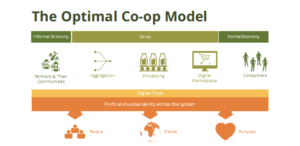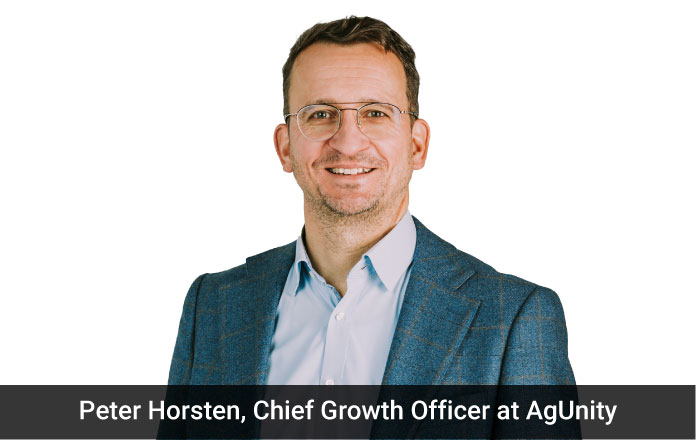As dawn breaks over a smallholder farm in a remote village, the serene landscape belies the profound challenges beneath. These farmers, who produce nearly 80% of the food consumed in much of the developing world, often struggle without the necessary resources and support. My journey into agriculture has been one of uncovering the transformative power of digitising smallholder value chains. From Ethiopia to Ghana, South Africa, and other regions, I’ve witnessed how systemic innovation can turn these challenges into opportunities, creating immediate, scalable solutions that empower farmers. Despite progress, much work remains.
The Power of Technology and Holistic Innovation
My background in sociology and digital technology has shaped my approach to addressing issues like poverty, food insecurity, and environmental degradation. In agriculture, systemic innovation—holistically addressing the entire value chain—unlocks sustainable growth for smallholder farmers.
This is not about quick fixes but about creating an ecosystem where technology, cooperation, and sustainable practices work together.
At AgUnity, our journey began with a simple idea: providing mobile phones equipped with our App to help farmers record transactions and build trust.
As we scaled, it became clear that true empowerment goes beyond technology alone—it involves building systems that support every aspect of farmers’ work.
Scaling Digital Solutions for Millions of Smallholders
The challenges facing smallholder farmers are immense, and the scale of the digital transformation required is daunting. This transformation cannot happen farm by farm; it requires a collective approach that begins with aggregation and market access.
Articles on PlanetStoryline, such as “The Evolution of Agritech: Paving the Way for Sustainable Agriculture“, and “What Are Some of the Agritech Business Ideas?“, highlight many innovations, but these solutions may not be directly applicable to smallholders who face distinct challenges like limited infrastructure and the digital divide in rural areas. Bridging this digital divide is crucial, but it is only one part of a much larger puzzle that needs solving on a massive scale.
In Ghana, we focus on key agricultural products like rice and shea alongside coffee and cocoa. Our strategy involves leveraging digital tools like the Co-op Management System and Cropslist to enhance supply chain efficiency and market linkages. Similarly, in South Africa, we’re digitising the vegetable value chain through a cooperative model that aggregates produce and delivers it to major retailers. This approach integrates formal and informal economies, enabling a sustainable, community-driven approach to agriculture.
The Critical Role of Data Ownership in Agricultural Success
As we build these digital systems, data ownership must not be overlooked. Farmers or their cooperatives must own their data to empower themselves, comply with new regulations, and build trust within the value chain.
During my visit to Ethiopia, I saw how data ownership could transform the Oromia Coffee Farmers Cooperative Union (OCFCU). With over 560,000 members, controlling their data enables them to meet compliance requirements, improve decision-making, and secure better prices.
Harnessing Collective Strength: How Co-Ops Drive Smallholder Success
Cooperatives have traditionally supported smallholder farmers, but they must evolve to meet new challenges. A well-structured co-op model can organise farmers, enabling them to leverage collective bargaining for better prices and market access.
In South Africa, the Food Co-op model integrates formal and informal economies, allowing smallholders to manage food gardens, share resources, and gain improved market access through formal retailers. This approach aligns with global sustainability goals by promoting sustainable farming practices.
The Transformative Impact of Digital Tools on Agriculture
Systemic innovation requires integrating digital tools across the agricultural ecosystem. Digital empowerment allows cooperatives and farmers to manage resources more efficiently, enhance transparency, and streamline operations. At AgUnity, we’ve evolved from providing mobile phones to developing comprehensive digital solutions that empower farmers and cooperatives alike. Our Co-op Manager, for example, simplifies record-keeping and strengthens cooperative structures by making information accessible and actionable.
The Need for Policy and Market Reforms in Agriculture
Systemic change must extend beyond the farm and cooperative level to include policy and market reforms. New sustainability regulations like EUDR push the agricultural sector towards greater accountability, but these must be complemented by policies that support smallholders in achieving compliance. This includes creating fair, transparent, and inclusive market systems, providing farmers with the necessary tools, financial support, and knowledge.
Empowering Smallholders Through Strategic Action
Imagine smallholder farmers equipped with the tools, knowledge, and organisation needed to not only comply with regulations but to thrive within a global agricultural system.
To get this started in a sustainable way, we must focus on ensuring they can sell their produce at the best possible price with minimal losses.
By achieving this, we lay the foundation for broader systemic change, enabling farmers to adopt digital tools, improve their practices, and thrive in a global market.

A Collaborative Vision for Sustainable Agricultural Transformation
Achieving this vision requires a collaborative effort across sectors to implement solutions that are sustainable and scalable. Systemic innovation is about building an agricultural system that supports continuous growth and development.
At AgUnity, we are committed to this journey of progress. Our work across multiple regions has shown that transformation is possible, but it requires a deep understanding of local contexts, a commitment to empowering farmers, and a willingness to embrace systemic change. By integrating digital tools, supporting cooperatives, ensuring data ownership, and advocating for fair market practices, we can create a future where smallholder farmers are not just surviving but thriving.
Join us in shaping the future of agriculture. Whether you’re a farmer, a policymaker, a technologist, a buyer, a processor, a retailer, or an investor, your role is crucial. Let’s collaborate to empower smallholder farmers, create sustainable food systems, and drive systemic change. Visit AgUnity’s website, https://agunity.com, to learn more about our initiatives and find out how you can get involved. Together, we can ensure that smallholder farmers are not just surviving but thriving in a global marketplace.
About the author
Peter Horsten is the Chief Growth Officer at AgUnity, a pioneering tech company dedicated to enhancing the lives of smallholder farmers through digital solutions. With a dual background in electrical engineering and sociology, Peter combines deep technical expertise with a passion for social impact. His career spans over three decades in tech and consulting, focusing on leveraging technology for sustainable impact. At AgUnity, Peter spearheads initiatives that drive systemic change, enabling smallholder farmers organisations to thrive in the digital economy.





